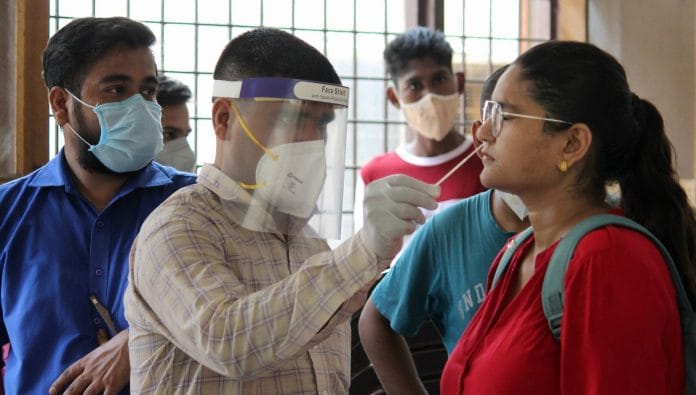New Delhi: The focus of the Covid-19 pandemic in the last four months has been primarily on the elderly while its impact on the youth has largely been undocumented.
But now four new studies have come out, which reveal the impact of the pandemic on adolescents and youth.
The studies have been conducted by three NGOs during the lockdown. They have assessed the knowledge and awareness of the pandemic among the youth in three states, the impact of the pandemic on reproductive and mental health of women, adolescents and children, and the experiences of civil society organisations while working with adolescents during the lockdown.
The studies were released at an online seminar Tuesday.
Dr Manohar Agnani, joint secretary in the health ministry, who attended the webinar, said, “It is unfortunate that due to the pandemic, we have had to pool our resources to fight Covid-19, but both adolescent health and reproductive health are a priority for us.
“The ministry is engaging with youth networks for skill-building and spreading awareness about mental health. Distribution of menstrual hygiene products needs to be explored. We are working to look at alternate delivery mechanisms,” he added.
Also read: Discuss depression, anxiety disorders openly so that people can seek help: Centre tells states
The studies
The first study titled Rapid assessment of impact of Covid-19 on youth of three states and the second titled Impact of Covid-19 on the access and availability of health and nutritional services for children, adolescents and women have been conducted by the Population Foundation of India (PFI).
The third study — Impact of Covid-19 on adolescent reproductive health — has been conducted by Quilt.Al, and the fourth study — Experiences of civil society organisations working with adolescents — has been conducted by Dasra.
The studies found that while there is a high level of awareness among the respondents about the pandemic and the necessary health practices, for women, children and adolescents access to health care services has been affected, especially access to sanitary pads and contraceptives.
In addition, a study of the search patterns by adolescents and youths on the internet has revealed that searches for at-home abortion methods and abortion pills spiked during the lockdown. Searches related to domestic abuse have also increased during the lockdown.
Awareness about the pandemic
One of the studies by the PFI examined the awareness and knowledge about the pandemic among the youth in three states — Rajasthan, Bihar and Uttar Pradesh. The study was conducted on 801 respondents aged between 15 and 24 years via phone interviews.
The study revealed that 89 per cent of the respondents were able to identify at least two Covid symptoms, while 100 per cent of them said they washed their hands frequently, and 96 per cent said they covered their face during the lockdown.
The study also said that 61 per cent sourced their information on the virus from television, while an encouraging 49 per cent did the same from frontline workers. Only 30 per cent consumed information about the virus from WhatsApp. Just 5 per cent of the respondents had experienced Covid symptoms and visited a doctor.
As far as reproductive health is concerned, 58 per cent women under 18 years of age and 51 per cent above 18 years reported an unmet need for sanitary pads.
What online searches showed
The study by Quilt.AI conducted on search engines across India has given further insights into the concerns of women’s reproductive health during the lockdown.
Many school-going girls, who had access to menstrual hygiene products at government schools and anganwadis lost access to them during the lockdown, the study found.
Online searches for sanitary pads and tampons surged across districts and cities. Interest in tampons increased by 70 per cent in cities and 15 per cent in districts, according to the study.
Searches on how to use tampons also increased by three-fold, suggesting a new category of users, the study said.
Despite abortion being listed as an essential service, access to it was difficult during lockdown as the study found 48 per cent and 14 per cent increase in searches for abortion pills and at-home methods of abortion since March in cities and districts, respectively.
In addition, searches related to domestic abuse saw an increase during the lockdown — 28 per cent in cities across all states and 22 per cent in districts or towns.
Also read: Recovered Covid patients suffer from anxiety, depression, PTSD, Italian study finds
Toll on mental health
The study by Dasra, which worked with 111 civil society organisations to understand their experience of working with adolescents and young adults during the lockdown, revealed the toll the pandemic took on mental health.
Of the 111 organisations, 46 per cent said young people had approached them with feelings of fear and anxiety in the lockdown, 29 per cent feared death from Covid, while 6 per cent said they had young people approach them with suicidal feelings.
The PFI’s rapid assessment study also found that 24 per cent males and 22 per cent females reported feeling depressed and this was more among those above 18 years of age. What’s encouraging, however, is that 55 per cent of the respondents had access to information about mental health, the study said.
With the coronavirus unlikely to go anytime soon, the NGOs believe that focus on the youth is essential.
“With young people making up almost one-fifth of our population, it is imperative that we look closely at the implications of Covid-19 and the lockdown on their health and well-being. Covid-19 will have far-reaching consequences not only on their health, but also their education and social lives. It will increase vulnerability to violence and deepen existing inequalities,” said Poonam Muttreja, Executive Director, PFI.
Also read: A huge mental health crisis awaits India post-Covid, but only the power of community will help






